(完整版)be_going_to表一般将来时知识点及练习题
一般将来时begoingto与will的解析和练习

练习4: 完形填空
The party (1) at 8 pm tomorrow. We (2) many things to prepare. First, we (3) some food and drinks. Then we (4) the furniture and (5) some music. We hope you can join us!
使用正确的动词和时间状语。
练习8: 用一般将来时回答问题
使用正确的动词形式描述将发生的事情。
一般将来时中的日常口语表达
常用短语
1. I am going to… (我打算… ) 2. She will probably… (她可能会… ) 3. He will most likely… (他很可能会… )
一般将来时 bgoingto 与 will 的解析和练习
一般将来时是英语中最常用的时态之一,它用来描述将要发生的事情或预测 未来。本文将讨论一般将来时的两种构成方式:be going to 和 will。我们将 解析它们的用法,区别,在多种情景中的应用,并提供丰富的练习来帮助你 熟练掌握这种时态。
一般将来时的概述
时间状语从句的使用方法
时间状语从句用于描述一种更具体的时间或日期,并且通常以连词“when”或 “while”开始。
其他表示未来的形式
除了一般将来时,还有许多其他描述未来的语法形式,如进行时将来时和完 成时将来时。
一般将来时中的动词时态
动词时态用于描述正在进行的动作,是否完成或是否在将来进行。未来进行时态,将来完成时态和现在 完成进行时态均用于将来某个时刻或动作的描述。
练习3: 改变句子的时态
练习1
改写下面的句子,用将来进行 时: "I will be studying English tomorrow."
be-going-to-结构以及与will区别以及练习

2017.11.26“be going to" 结构一、“be going to"表示将要发生的事或打算、计划、安排要做的事。
它是一般将来时的一种表达形式,其后常有表示将来的时间状语.如:tomorrow, next week等.例如:We are going to play football tomorrow。
明天我们将去踢足球。
二、构成:be going to +动词原形。
在be going to 结构中,be随主语人称和数的变化而变化,而going to 固定不变。
例如:He is going to clean the classroom tomorrow.They are going to clean the classroom tomorrow。
三、句式变化:be going to 结构的句式变化都可在be上完成。
变疑问句时,将be提至主语之前;变否定句在be后加not。
例如:They are not going to have a picnic next week.下星期他们将不去野餐。
Are they going to have a picnic next week?下星期他们将去野餐吗?What are they going to do next week?下星期他们打算干什么?四、“be going to +动词原形"的用法。
1。
表示主语打算、安排在最近或将来要做某事或出现的某种状态。
这种主观意图,一般已做过事先安排,故其实现的可能性较大,其主语常是人.例如:We are going to swim next Sunday.下星期天我们打算去游泳。
(已打算好下星期天去游泳)2。
表示根据现有情况、某种迹象,判断将要或即将发生的动作。
此时不含有主观意图,只是表示说话人对客观事态发展的判断或推测,此时主语可以是人,也可以是物。
例如:Look! It’s going to rain。
一般将来时be-going-to-与will解析和练习备课讲稿-2023年学习资料
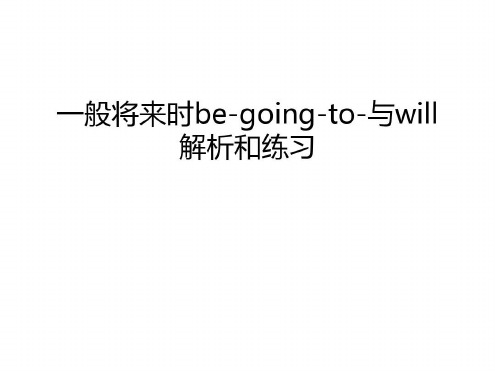
四、there be句型的一般将来时-1.There is/are going to be-知:There is going to be a sports meeting at-our school next we k,-一般疑问式:-Is there going to be a sports meeting at-ou school next week?-回答:-Yes,there is./No,there isn't-否 句式:-There isn't going to be a sports meeting at-our s hool next week.
四、使用be going to应注意的两点-1.there be句型中going to后面的be不能改为ave-例如:-There is going to be a football match next-Sa urday in our school.-下周六我们学校将有一场足球比赛。e,go,leave arrive等表示位置移动的动-词常用现在进行时表示将要发生的动作,它-们很少与be going to结构 用。例如:-Miss Sun is coming tonight.-今晚孙小姐要来。
殷将来时的构成:-1.be going to+动词原-形-2.助动词W山+动词原形-动词原形包指动词be和 为动词原形
一、be going to的用法点拨-be going to是一种固定结构,后面接动词原-形,用来表示按计 或安排要发生的动作,-有时也可以表示推测将要或肯定会发生的-动作,有“准备;打算”的意思。含有be-goi g to结构的句子中往往有表示将来的时-间状语。例如:-We are going to have a cl ss meeting this-afternoon.-今天下午我们打算开班会。-Look at the b ack clouds.It's going to rain.-看那些乌云,快要下雨了。(推测
Be_going_to的用法与练习

be going to 帮你来“打算”一、概念:be going to 表示将要发生的动作或存在的状态及打算、计划或准备做某事。
属于一般将来时。
二、基本结构:①be going to + do;②will+ do.be going to的特殊疑问句形式构成方式:疑问词+be going to的一般疑问句。
一个口诀献给大家:疑问词在句首,系动词be跟着走,主语、going紧相随,它成分不要丢。
三、否定句:在be动词(am, is, are, was, were)或情态动词will后加not成won’t。
例如:I’m going to have a picnic this afternoon.I’m not going to have a picnic this afternoon.四、一般疑问句:be或will提到句首,some改为any, and改为or,第一二人称互换。
例如:We are going to go on an outing this weekend.Are you going to go on an outing this weekend?五、同义句:be going to = willI am going to go swimming tomorrow(明天). = I will go swimming tomorrow.但是特别注意:be going to与will两者都可表示将要发生的事、将要去做某事,但它们有如下几点区别:1. be going to 表示近期、眼下就要发生的事情,will 表示的将来时间则较远一些,如:He is going to write a letter tonight.He will write a book one day.2. be going to 表示根据主观判断将来肯定发生的事情,will表示客观上将来势必发生的事情。
He is seriously ill. He is going to die.He will be twenty years old.3. be going to 含有“计划,准备”的意思,而will 则没有这个意思,如:She is going to lend us her book.He will be here in half an hour.现在口语书面语言在互相交织的今天,从不严格的语法角度,二者互换也是可以接受的。
(完整版)初中基础语法一般将来时、be_going_to用法.doc
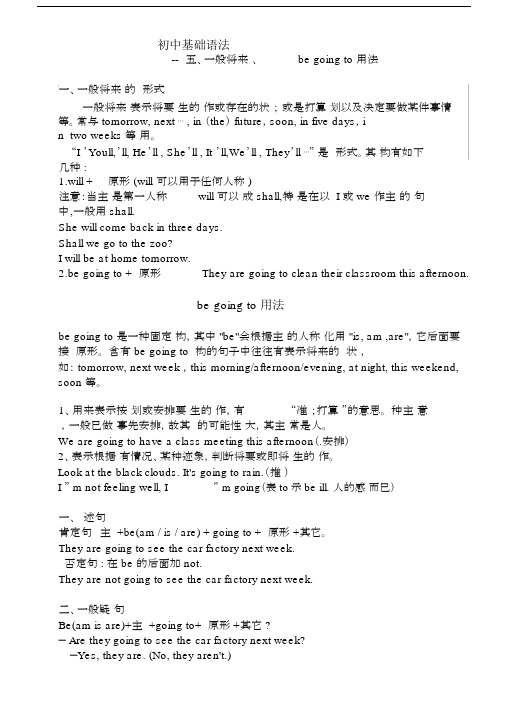
初中基础语法--五、一般将来、be going to 用法一、一般将来的形式一般将来表示将要生的作或存在的状;或是打算划以及决定要做某件事情等。
常与 tomorrow, next ⋯ , in (the) future,soon, in five days,in two weeks 等用。
“I ’Youll,’ll, He’ll , She’ll , It ’ll,We’ll , They’ll ⋯”是形式。
其构有如下几种 :1.will +原形(will可以用于任何人称)注意:当主是第一人称will 可以成 shall,特是在以 I 或 we 作主的句中,一般用 shall.She will come back in three days.Shall we go to the zoo?I will be at home tomorrow.2.be going to +原形They are going to clean their classroom this afternoon.be going to 用法be going to 是一种固定构,其中 "be"会根据主的人称化用 "is, am ,are",它后面要接原形。
含有 be going to 构的句子中往往有表示将来的状,如: tomorrow, next week ,this morning/afternoon/evening, at night, this weekend, soon 等。
1、用来表示按划或安排要生的作,有“准;打算”的意思。
种主意,一般已做事先安排,故其的可能性大,其主常是人。
We are going to have a class meeting this afternoon(.安排)2、表示根据有情况、某种迹象,判断将要或即将生的作。
Look at the black clouds. It's going to rain.(推)I ” m not feeling well, I” m going(表to示be ill.人的感而已)一、述句肯定句主+be(am / is / are) + going to +原形+其它。
整理be going to表一般将来时

be going to表一般将来时一、概念be going to 是一种固定结构,它后面要接动词原形。
含有be going to 结构的句子中往往有表示将来的时间状语,如:tomorrow, next week ,this morning, this afternoon, this evening, tonight, tomorrow, this weekend, next week, next year, soon 等。
(1) 表示主语的意图,即主语计划或打算要做的事。
We are going to have a class meeting this afternoon.今天下午我们打算开班会。
(安排)(2) 表示主语根据目前迹象所作出的推测。
① Look at the black clouds. It's going to rain.看那些乌云,快要下雨了。
(推测)① I’m not feeling well, I’m going to be ill. 我感觉不是很好,可能要生病了。
(表示说话人的感觉而已)二、肯定句结构主语+be(am / is / are) + going to +动词原形+其它。
(当主语是I 时用am ;当主语是第三人称单数时用is;当主语是其他人称时用are)① I am going to buy something tomorrow morning. 明天早上我要去买些东西。
① She is going to see Mr. Wang this afternoon. 她打算今天下午去看望王先生。
① They are going to visit the factory next week. 他们打算下周参观这家工厂。
三、否定句结构主语+be(am / is / are)+not + going to +动词原形+其它。
They are not going to visit the factory next week. (否定句)四、疑问句结构be(am / is / are)+主语+ going to +动词原形+其它?肯定回答:Yes, 主语+ am/is/are.否定回答:No, 主语+ isn't/aren't. / No, I'm not.不过I am... 在改为一般疑问句时常常改为“Are you ....?”。
Unit 6一般将来时be going to(重点语法提升练) (人教版)

2022-2023学年八年级英语上册单元模块满分必刷题(人教版)Unit 6【刷语法】(重点语法提升练) 一般将来时be going to一般将来时一般将来时表示将来某一时刻的动作或状态,或将来某一段时间内经常的动作或状态。
常与一些表示将来的时间状语连用,如:tomorrow(明天),next week(下周),from now on(从现在开始);in the future(将来),in a few days等。
1、基本结构:be going to+动词原形一般将来时:be going to+动词原形意为自己打算做某事、计划做某事或者有意做某事,be 动词随主语不同可变为is,am,are.它的句式变化如下:一、单项选择1.(2021·河北·石家庄市第四十二中学八年级期中)— What is your plan for next weekend, Lingling?— I ________ volunteer(志愿者) work in the museum.A.is going to do B.did C.am going to do D.does2.(2022·江苏·八年级课时练习)Look! It is dark outside. I think it ________ soon.A.is going to rain B.rains C.is raining D.rained3.There ________ a basketball competition this weekend.A.will take place B.will hold C.is going to be D.will have4.(2021·重庆市璧山中学校八年级期中)—Look at the poster on the wall!—Wow! There _______ an art show next month in Bishan Middle School.A.is going to be B.is going to have C.are going to be D.are going to have 5.(2021·上海奉贤·八年级期中)There is going to ________ a football match this afternoon.A.have B.has C.is D.be6.(2021·山东济南·八年级期中)—What do you plan to do this weekend?—We ________ soccer. We play it once a week.A.play B.playedC.are going to play D.are playing7.(2021·广东·湛江一中培才学校八年级期中)There ________ a concert at 7:00 this evening.A.is going to have B.is going to be C.is having D.will have8.(2021·河北·石家庄市第二十八中学八年级期中)There ________ two new movies in Sunshine Movie Theater tonight.A.is going to have B.will have C.is going to be D.are going to be 9.(2021·河北·石家庄市第二十八中学八年级期中)—Shall we go to the museum tomorrow?—I’d love to, but I’m afraid I can’t. I ________ my grandparents.A.visit B.visited C.am going to visit D.is visiting 10.(2021·河北·石家庄市第二十五中学八年级期中)— Mom, I ________ my clothes when I come back home.— OK. You promise me.A.am washing B.am going to wash C.washed D.wash11.(2021·黑龙江·哈尔滨市第十七中学校八年级期中)—Are there any robots in your home now?—No, but there ________ a lot of robots in people’s homes ________.A.will be, 100 years ago B.are going to have, in 100 years C.are going to be, in 100 years 12.(2019·福建省福州第十九中学八年级期中)Look at those big black clouds. It ________ rain. Let’s hurry.A.must B.will C.would D.is going to 13.(2021·广东·东莞市新世纪英才学校八年级期中)________ your cousin ________ me next week? A.Is; going to visit B.Does; going to visit C.Is; goes to visit D.Does; goes to visit 14.(2018·广东·珠海市斗门区实验中学八年级期中)—My sister and I _________ the park this Sunday. Do you want to go with us?A.visit B.visits C.visited D.are going to visit 15.(2020·辽宁·灯塔市教师进修学校八年级期中)There is going to ________ a meeting the day aftertomorrow(后天).A.have B.be C.has D./二、完成句子16.——本周末打算去哪儿野餐,杰克?——玉湖公园。
(完整版)语法一般将来时begoingto讲解与练习
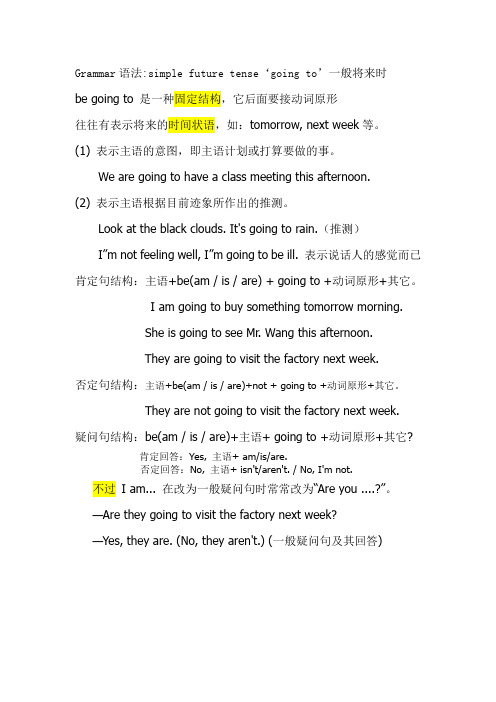
Grammar语法:simple future tense‘going to’一般将来时be going to 是一种固定结构,它后面要接动词原形往往有表示将来的时间状语,如:tomorrow, next week等。
(1) 表示主语的意图,即主语计划或打算要做的事。
We are going to have a class meeting this afternoon.(2) 表示主语根据目前迹象所作出的推测。
Look at the black clouds. It's going to rain.(推测)I”m not feeling well, I”m going to be ill. 表示说话人的感觉而已肯定句结构:主语+be(am / is / are) + going to +动词原形+其它。
I am going to buy something tomorrow morning.She is going to see Mr. Wang this afternoon.They are going to visit the factory next week.否定句结构:主语+be(am / is / are)+not + going to +动词原形+其它。
They are not going to visit the factory next week.疑问句结构:be(am / is / are)+主语+ going to +动词原形+其它?肯定回答:Yes, 主语+ am/is/are.否定回答:No, 主语+ isn't/aren't. / No, I'm not.不过I am... 在改为一般疑问句时常常改为“Are you ....?”。
—Are they going to visit the factory next week?—Yes, they are. (No, they aren't.) (一般疑问句及其回答)be going to 的特殊用法(1)There be 句型的be going to 结构为:There is / are going to be...(注意句型中going to 后面的be不能改为have。
Be_going_to练习

be going to练习姓名:_____ 班级: _______ 学号:_________be going to "一般将来时"。
表示将来某个时间将要发生的动作或存在的状态。
表示"打算,将要"。
其中"be"会根据主语的人称变化派出"is, am ,are"来完成任务。
"to"后面的动词必须是动词原形。
表示将来时间的词语this morning, this afternoon, this evening, tonight, tomorrow, this weekend, next week,next year, soon等一、陈述句肯定句:主语+be(am / is / are) + going to +动词原形+其它。
否定句:在be的后面加not.二、一般疑问句Be(am is are)+主语+going to+动词原形+其它?三、特殊疑问句疑问词+be(am is are)+主语+ going to+动词原形+其它四、There be 结构用于一般将来时There is/are going to be+主语+其它练习题:一、改写句子。
1. I’m going to take part in the long jump.否定句:_______________________________________________一般疑问句:___________________________________________就画线部分提问:________________________________________2. He is going to join the school basketball team.否定句:________________________________________________一般疑问句:___________________________________________就画线部分提问:________________________________________3. Are they going to join in the school rowing team?肯定句:_________________________________________________否定句:_________________________________________________二、用所给动词的适当形式填空1.Jim and Li Lei (watch)the football match this evening.2.__________ she ________________________(have)a Chinese lesson tomorrow?3.—What __________ you _________________________(do)tomorrow morning?—I _____________________(see)my parents.4.__________ they_______________(go)fishing this Friday afternoon?5.There _________________________(be)a birthday party this evening.三、按要求改写下列各句1.They are going to play ping-pong on Saturday.(改为一般疑问句并作否定回答)—__________ __________ going to play ping-pong on Saturday?—__________,________________.2.He's going to tell me a story.(改为否定句)He __________ __________ going to tell me a story.3.The students of Class Three have a picnic on Sunday.(用next Sunday改写)The students of Class Three __________ __________ __________ __________ a picnic next Sunday.4.Linda has lunch at school on Tuesdays.(用next Tuesday改写)Linda __________ __________ __________ __________ lunch at school next Tuesday.汉译英1.我们打算明天去买一些英语书。
语法一般将来时be going to讲解与练习
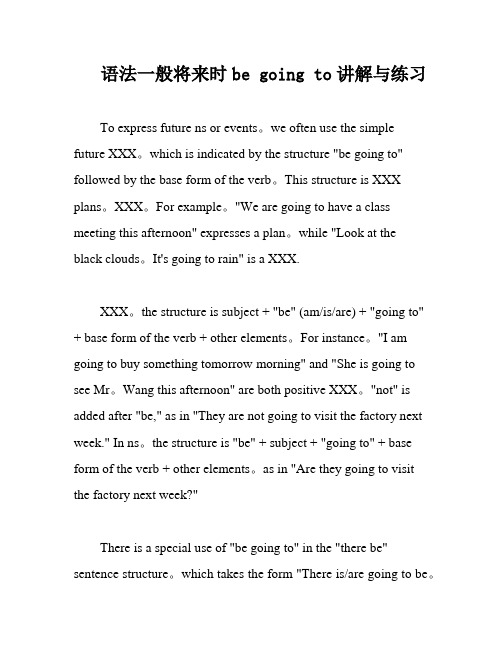
语法一般将来时be going to讲解与练习To express future ns or events。
we often use the simplefuture XXX。
which is indicated by the structure "be going to" followed by the base form of the verb。
This structure is XXX plans。
XXX。
For example。
"We are going to have a class meeting this afternoon" expresses a plan。
while "Look at theblack clouds。
It's going to rain" is a XXX.XXX。
the structure is subject + "be" (am/is/are) + "going to" + base form of the verb + other elements。
For instance。
"I am going to buy something tomorrow morning" and "She is going to see Mr。
Wang this afternoon" are both positive XXX。
"not" is added after "be," as in "They are not going to visit the factory next week." In ns。
the structure is "be" + subject + "going to" + base form of the verb + other elements。
初中英语 人教版八年级上册语法专项-一般将来时讲解+时态混合练习题(含答案)

一般将来时讲解与时态混合练习题“be going to+动词原形”是一般将来时的一种表达形式,表示将要发生的动作或情况,be动词随主语的人称和数的变化而变化。
1.肯定句:主语+be going to+动词原形+其他2.否定句:主语+be not going to+动词原形+其他.3.一般疑问句:Be+主语+going to+动词原形+其他?肯定回答:Yes,主+be.否定回答:No,主语+be not.4.特殊疑问句:疑问词+be+主语+going to+动词原形+其他?用法:(1)表示将要发生的动作或安排,或打算、计划、决定要做的事。
(2)表示主语根据当前的情况做出的预测。
通常是有迹象表明某事即将发生,表达说话人较肯定的判断,指即将发生或肯定要发生的事,常用于I'm sure,I'm afraid或I think等后面。
(3)常与be going to连用的时间状语be going to 表达的是未发生的动作,因此常与一些表示将来的时间状语连用。
例如:tomorrow,this evening,next month,in three weeks等。
有时也可与before, after等引导的时间状语从句连用。
一般将来时1)一般将来时的构成:1. 助动词will(shall)+动词原形2. am / is / are+going to +动词原形2)一般将来时的用法:1.将要发生的动作。
例如:I will leave for Beijing tomorrow.2.将要存在的状态。
例如:This time next year I will be in Japan. Where will you be?3.打算要做的事。
例如:Are you going to watch the film on television tonight?3)常用于一般将来时的时间状语:tomorrow、next week、in 2008等。
be_going_to 句型练习
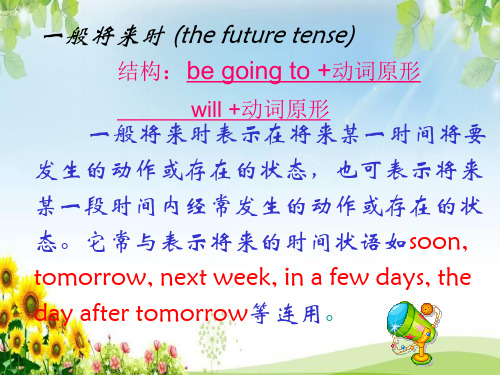
表示将要发生的动作,含有“打算”的意思。
tomorrow , next week/Sunday , this evening…
主语 + be going to + 动词的原形
She is going to play football. He is going to go fishing. It is going to do its homework.
1.Mr. Lee is _m__y__ teacher. H__e__ is very kind to _m_e__.
2.Ann gave __h_i_m__ a book and he gave__h_e_r_ a pen in return.
3.Helen is a friend of _m_i_n_e.
3.___ (It, Its, It’s) is a new book. ___ cover is red.
4.Can ___ do the job ___? (your, you, yours, yourself)
根据提示回答: 1. How are you going to Canada?(乘飞机)
我妹妹下星期要去游泳。
They are going to _li_s_te_n__to__th_e_m__u_s_ic_on Sunday.
星期天他们要去听音乐。ou he she it they
宾格
me us you you him her it them
物主代词
• be going to "一般将来时"。表示将来某个时间将要发生 的动作或存在的状态。表示"打算,将要"。其中"be"会 根据主语的人称变化派出"is, am ,are"来完成任务。"to" 后面的动词必须是动词原形。
一般将来时讲解(附习题+答案)

一般将来时讲解(附习题+答案)一、一般将来时的含义:表示动作发生在将来二、一般将来时的句型:(1) will/shall+动词原形(2) be going to+动词原形三、一般将来时的时间状语:tomorrow(明天)、the day after tomorrow(后天)、next...(下一...): next week(下一周)、next year(明年)、next month(下个月)in+一段时间(...之后): in three days(三天之后)、in the future在未来this evening(今天晚上)四、一般将来时的句型结构:(1) will/shall+动词原形(will not =won’t)(will 各种人称均可用,shall 只能用于第一人称)1)肯定句:主语+will/shall+动词原型...如:I will go to school tomorrow.我明天将会去学校He will go to school tomorrow.他明天将会去学校。
2)否定句:主语+will/shall+not+动词原型...如:I won’t go to school tomorrow.我明天将不会去学校。
He won’t go to school tomorrow.他明天将不会去学校。
3)一般疑问句:Will/Shall +主语+动词原型...如:Will you go to school tomorrow?你明天要去学校吗?Will he go to school tomorrow?他明天要去学校吗?肯定回答:Yes, 主语+will.如:Yes, I will.Yes, he will.否定回答:No,主语+will+not.如:No, I won’t.No, he won’t.4) 特殊疑问句:特殊疑问词+will/shall+主语+动词原型...如:What will you do tomorrow?你明天将会做什么?What will he do tomorrow?他明天将会做什么?(2) be going to+动词原形1)肯定句:主语+be going to +动词原型...如:I am going to buy some books tomorrow.我明天打算去买一些书。
一般将来时之 going to 习题(答案及解析)

我们用be going to 来做预测,特别是当我们看到即将发生的事情时。
这意味着我们有证据,我们根据证据而不仅仅是我们的个人意见,在实际使用中要根据主语来选择正确的be 动词。
一、使用be going to 的正确形式来完成下列的句子1、They _____ a picnic. (to have)2、I _____ a new car. (to buy)3、Kevin and Lilly _____ their honeymoon in Portugal. (to spend)4、It's so cloudy. I think, it _____ soon. (to rain)5、We _____ next month. (to get married)6、She _____ a red dress to the party. (put on)7、They _____ their mother on the way back. (visit)8、You _____ the competition. (to take part in)9、I _____ dinner for my wife. (to cook)10、He _____ in Japan. (to work)二、答案及解析1、are going to have解析:主语they 是复数,所以用are going to have。
2、am going to buy解析:主语是I,所以用am going to buy。
3、are going to spend解析:主语Kevin and Lilly 是复数,所以用are going to spend。
4、is going to rain解析:主语It 是单数,所以用is going to rain。
5、are going to get married解析:主语We 是复数,所以用are going to get married。
(完整版)英语将来时态讲解、练习、答案

将来时表示法一般将来时表示在将来某个时间要发生的动作或存在的状态。
表示“将来”的句式很多,常用的句式及用法归纳如下:一、be going to+动词原形(专题与will的区别)1.这种结构表示主体现在打算在最近或将来要做某事。
这种打算往往是事先考虑好的。
如:My brother is going to learn English next year. 我哥哥准备明年学英语。
I am going to meet Tom at the station at six. 我六点钟要到火车站去接汤姆。
2.这种结构还可以表示说话人根据已有的迹象认为非常可能即将发生某事。
如:Look at these black clouds——it is going to rain. 看这些乌云——要下雨了。
I’m afraid I’m going to have a bad cold. 恐怕我要得重感冒了。
注意:1. 如果be going to后接的是形容词或副词(there)时,其后应加上be,然后再接形容词或副词。
如:I’m going to be busy this Sunday. 这个星期天我很忙2. there be句型也可用于这种句型中,但there不能和have连用。
如:There is going to be an English film this evening. 今天晚上有一场英文电影。
二、shall/ will+动词原形。
在书面语中,第一人称常用shall, 但在口语中,所有人称都可用will.1.will/ shall均可表示单纯的将来。
如:The radio says it will be cloudy tomorrow. 收音机报道明天多云。
2.表示预料中将要发生的动作或情况。
如:You’ll feel better after having this medicine.吃了这药,你就会感到好些的。
(完整版)将来进行时的讲解及练习
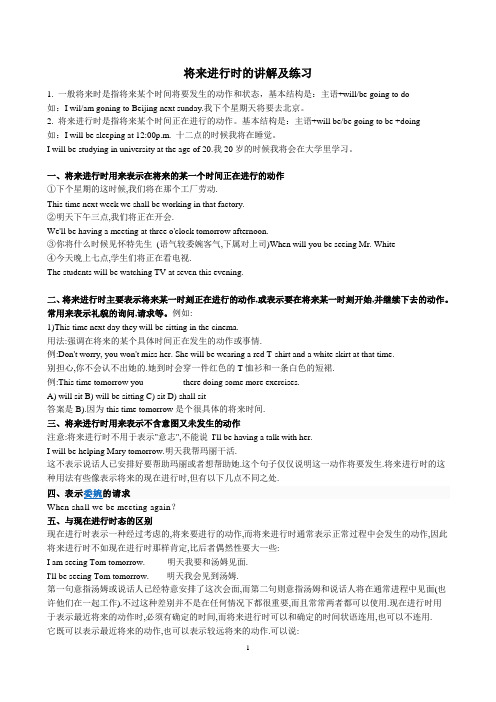
将来进行时的讲解及练习1. 一般将来时是指将来某个时间将要发生的动作和状态,基本结构是:主语+will/be going to do如:I wil/am goning to Beijing next sunday.我下个星期天将要去北京。
2. 将来进行时是指将来某个时间正在进行的动作。
基本结构是:主语+will be/be going to be +doing如:I will be sleeping at 12:00p.m. 十二点的时候我将在睡觉。
I will be studying in university at the age of 20.我20岁的时候我将会在大学里学习。
一、将来进行时用来表示在将来的某一个时间正在进行的动作①下个星期的这时候,我们将在那个工厂劳动.This time next week we shall be working in that factory.②明天下午三点,我们将正在开会.We'll be having a meeting at three o'clock tomorrow afternoon.③你将什么时候见怀特先生(语气较委婉客气,下属对上司)When will you be seeing Mr. White④今天晚上七点,学生们将正在看电视.The students will be watching TV at seven this evening.二、将来进行时主要表示将来某一时刻正在进行的动作,或表示要在将来某一时刻开始,并继续下去的动作。
常用来表示礼貌的询问,请求等。
例如:1)This time next day they will be sitting in the cinema.用法:强调在将来的某个具体时间正在发生的动作或事情.例:Don't worry, you won't miss her. She will be wearing a red T-shirt and a white skirt at that time.别担心,你不会认不出她的.她到时会穿一件红色的T恤衫和一条白色的短裙.例:This time tomorrow you ________ there doing some more exercises.A) will sit B) will be sitting C) sit D) shall sit答案是B).因为this time tomorrow是个很具体的将来时间.三、将来进行时用来表示不含意图又未发生的动作注意:将来进行时不用于表示"意志",不能说I'll be having a talk with her.I will be helping Mary tomorrow.明天我帮玛丽干活.这不表示说话人已安排好要帮助玛丽或者想帮助她.这个句子仅仅说明这一动作将要发生.将来进行时的这种用法有些像表示将来的现在进行时,但有以下几点不同之处.When shall we be meeting again?五、与现在进行时态的区别现在进行时表示一种经过考虑的,将来要进行的动作,而将来进行时通常表示正常过程中会发生的动作,因此将来进行时不如现在进行时那样肯定,比后者偶然性要大一些:I am seeing Tom tomorrow. 明天我要和汤姆见面.I'll be seeing Tom tomorrow. 明天我会见到汤姆.第一句意指汤姆或说话人已经特意安排了这次会面,而第二句则意指汤姆和说话人将在通常进程中见面(也许他们在一起工作).不过这种差别并不是在任何情况下都很重要,而且常常两者都可以使用.现在进行时用于表示最近将来的动作时,必须有确定的时间,而将来进行时可以和确定的时间状语连用,也可以不连用.它既可以表示最近将来的动作,也可以表示较远将来的动作.可以说:I am meeting him tomorrow. 我明天和他会面.I'll be meeting him tomorrow/next year/some time/. 我明天/明年/某时将与他会面.六、与一般将来时态的区别将来进行时通常表示的是对将来事实的简单陈述.而will+V. (一般将来时)除表示时间概念外,还带有感情色彩.e.g. 汤姆明天将正在割草. Tom will be cutting grass tomorrow.汤姆明天愿意割草. Tom will cut the grass tomorrow.将来进行时专项练习一、单项填空1. The Blacks with us for the time being.A. will stayB. would stayC. have been stayingD. will be staying2. The plane at the present speed until it crosses the mountain at about ten tonight.A. would goB. wentC. will be goingD. goes3. Mr. Smith will not be able to attend the meeting tonight because ______ then.A. he must have a classB. he will be teaching a classC. he teaches a classD. he will have been teaching a class4. I won’t be able to watch the concert on TV tonight because I homework at that time.A. shall have doneB. shall be doingC. shall doD. have been doing5. I _______ my boss at three this afternoon.A. shall be picking upB. shall be pickedC. shall have been picking upD. shall have picked6. You can’t miss Frank. He______ a dark green suit and a yellow tie waiting for you.A. is wearingB. will wearC. wearsD. will be wearing7. ----Could you give these books to Mr. Black?----Absolutely, _______him at five o’clock this afternoon.A.I will have a talkB. I have a talk withC.I can have a talk withD.I will be having a talk with8. I’m afraid I won’t be available then. I _____ a friend off at three t his afternoon.A. seeB. am seeingC. will seeD. will be seeing9. Next Friday I will go to another concert .They ____some thing by Mozart at that time.A. playB. will be playingC. are going to playD. are to play.10. ---What are you doing, Jack?---Make a model plane. I ____ it in the science class at 10 o’clock tomorrow morning.A. will be showingB. am going to showC. showD. have showed11. We _____ a debate on some environmental issues all afternoon tomorrow.A. will be havingB. am havingC. am going to haveD. have12. What do you think you _____at this time next year?A .will do B. will be doing C. are about to do D. do13. ---What will you do tomorrow evening?---I _____my favorite program between 8 and 11, then I will go out to drink in my usual bar.A. will watchB. am about to watchC. will be watchingD. am watching14. ---When will you come to see me, Dad?---I will go to see you when you_____ the training course.A. will have finishedB. will be finishingC. are finishingD. finish15. Tom sat under a tree and seeing his friend, up in no time.A. to standB. standingC. stoodD. would stand16. I _______ very happy if I could be of some service to you.A. would beB. have beenC. must beD. can be17. The meeting was to at 9 o’clock but the manager until twenty minutes later.A. start; didn’t turn upB. have started; didn’t turn upC. start; hadn’t turned upD. be started; hadn’t turned up18. ---- he come to see you?----Of course, please. And I’d rather he me the truth.A.Will; inform B.Shall; told C.Should; would say D.Can; spoke19. If the building project _____ by the end of this month is delayed, the construction company _____ fined.A. will be completed; is to beB. to be completed; will beC. being completed; will beD. completed; was20. ---- I rang you at about ten, but no one answered the phone.---- Oh, that was probably when I _______ my neighbor.A. visitedB. was going to visitC. was visitingD. had visited21. Because I the next day, I went to bed early on Saturday evening.A. was leavingB. will leaveC. had leftD. was about to leave22. ----Henry, fancy meeting you here.----Oh, it’s you Jack. Sorry, I ______ you ______ to me.A. didn’t think; w ere speakingB. don’t think; spokeC. didn’t think; would speakD. thought; are speaking23. By next summer John in this factory for thirteen years.A.has been working B.will have been workingC.will be working D.has worked24. He will have learned English for eight years by the time he __________ from the university next year.A. will graduateB. will have graduatedC. graduatesD. is to graduate25. I _______________ the office when the telephone rang.A. was about to leaveB. would leaveC. leftD. was to leave26. According to their agreement reached in 1943, no country ___________ peace with Germany alone.A. is to makeB. was to makeC. would makeD. was about to make27. He promised me if we_______ the game, he ________us a round of drink.A. win; will buyB. would win; would buyC. won; boughtD. won; would buy28. He said time and time again that he _________, but he actually stayed well after midnight.A. is leavingB. was leavingC. was to leaveD. will leave29. ----Mom, I got the first prize in the spelling contest.----Oh, how great! Daddy will be so proud of you. He _____ you _____ to win.A. never think; are goingB. never thought; were goingC. didn’t think; were goingD. hadn’t thought; were going30. Tom_________ to Jerry and tell him about his new school at once.A. will writeB. writesC. wroteD. writes二、用所给动词的适当形式填空1. He __________ (lie) on one of the sunny beaches in Hawaii all day when he spends his holiday there.2. Don’t call me between 2:00 and 4:00 this afternoon. I ________ (have) an test then.3. Nobody knew what ________ (happen) to the Eart h in a century’s time.4. Mr. Lee said he would give the CD to me as soon as he ______ (return) from Canada.5. When we were young, father________ (take) us for a special treat on Mother’s day.6. ----Did you invite Sarah to your birthday party?----Sorry, I forget. I _______ (call) her now.7. You have to put in more effort if you were _________ (pass) the test.8. I __________ (tell) you about my plan, but you stopped me before I could speak.9. Will you __________(use)your computer this time tomorrow?10. I __________ (close) the kitchen door when a little mouse popped its head out.三、中译英1. 我正打算往河里跳时看见水里出现一条蛇。
(完整版)be_going_to表一般将来时知识点及练习题
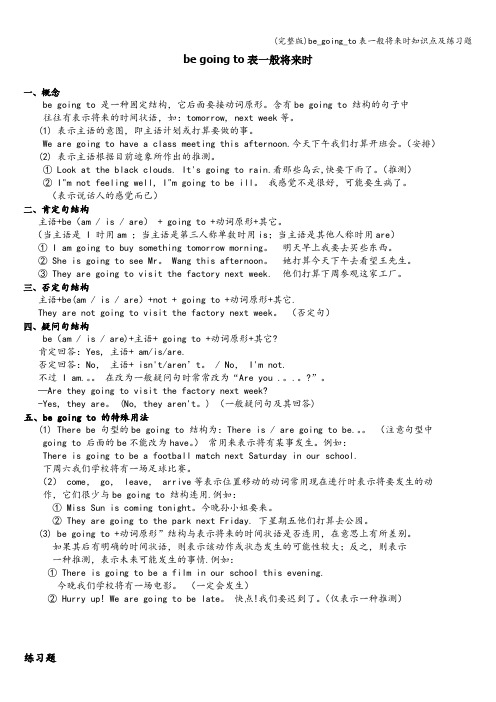
be going to表一般将来时一、概念be going to 是一种固定结构,它后面要接动词原形。
含有be going to 结构的句子中往往有表示将来的时间状语,如:tomorrow, next week等。
(1) 表示主语的意图,即主语计划或打算要做的事。
We are going to have a class meeting this afternoon.今天下午我们打算开班会。
(安排)(2) 表示主语根据目前迹象所作出的推测。
① Look at the black clouds. It's going to rain.看那些乌云,快要下雨了。
(推测)② I"m not feeling well, I"m going to be ill。
我感觉不是很好,可能要生病了。
(表示说话人的感觉而已)二、肯定句结构主语+be(am / is / are) + going to +动词原形+其它。
(当主语是 I 时用am ;当主语是第三人称单数时用is;当主语是其他人称时用are)① I am going to buy something tomorrow morning。
明天早上我要去买些东西。
② She is going to see Mr。
Wang this afternoon。
她打算今天下午去看望王先生。
③ They are going to visit the factory next week. 他们打算下周参观这家工厂。
三、否定句结构主语+be(am / is / are)+not + going to +动词原形+其它.They are not going to visit the factory next week。
(否定句)四、疑问句结构be(am / is / are)+主语+ going to +动词原形+其它?肯定回答:Yes, 主语+ am/is/are.否定回答:No,主语+ isn't/aren’t。
小学英语语法_一般将来时练习(be_going_to)
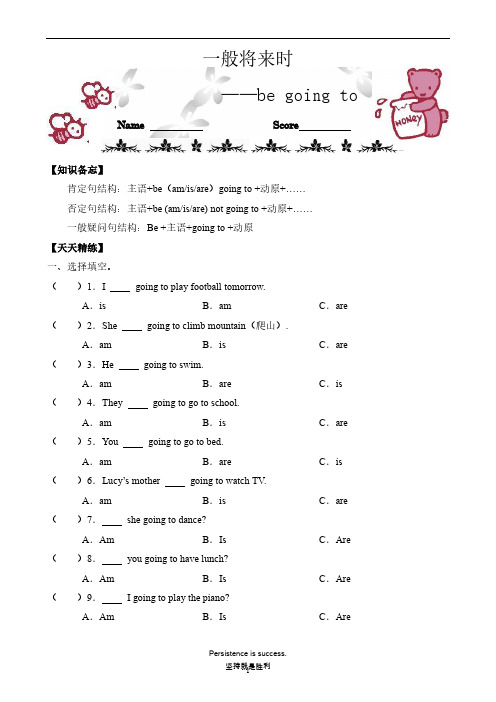
2.I’m going to have lunch.
3.Tom is going to watch TV.
4.You are going to do your homework.
5.Lucy’s father is going to work.
4.We are going to clean the house.
5.They are going to sweep the floor.
四、选择出合适的单词划上圈。 1.I am, is, are going to wash my hands. 2.He am, is, are going to play football. 3.Peter am, is, are going to watch TV. 4.We am, is, are going to clean our house.
一般将来时
——be going to
Name
Score
【知识备忘】
肯定句结构:主语+be(am/is/are)going to +动原+……
否定句结构:主语+be (am/is/are) not going to +动原+……
一般疑问句结构:Be +主语+going to +动原
【天天精练】
一、选择填空。
tomorrow.
tomorrow.
六、判断下列句子是否是一般将来时,是的打“T”,不是打“F” 1.I play computer games every day. 2.He is going to go to school. 3.I am going to school. 4.They watch TV every day. 5.Tom’s mother is going to cook dinner. 6.They are going to play games. 7.Don’t close the window. 8.I’m very hungry. 9.She is going to play the piano. 10.We are listening to music.
- 1、下载文档前请自行甄别文档内容的完整性,平台不提供额外的编辑、内容补充、找答案等附加服务。
- 2、"仅部分预览"的文档,不可在线预览部分如存在完整性等问题,可反馈申请退款(可完整预览的文档不适用该条件!)。
- 3、如文档侵犯您的权益,请联系客服反馈,我们会尽快为您处理(人工客服工作时间:9:00-18:30)。
be going to表一般将来时
一、概念
be going to 是一种固定结构,它后面要接动词原形。
含有be going to 结构的句子中往往有表示将来的时间状语,如:tomorrow, next week等。
(1) 表示主语的意图,即主语计划或打算要做的事。
We are going to have a class meeting this afternoon.今天下午我们打算开班会。
(安排)
(2) 表示主语根据目前迹象所作出的推测。
①Look at the black clouds. It's going to rain.看那些乌云,快要下雨了。
(推测)
②I”m not feeling well, I”m going to be ill. 我感觉不是很好,可能要生病了。
(表示说话人的感觉而已)
二、肯定句结构
主语+be(am / is / are) + going to +动词原形+其它。
(当主语是I 时用am ;当主语是第三人称单数时用is;当主语是其他人称时用are)
①I am going to buy something tomorrow morning. 明天早上我要去买些东西。
②She is going to see Mr. Wang this afternoon. 她打算今天下午去看望王先生。
③They are going to visit the factory next week. 他们打算下周参观这家工厂。
三、否定句结构
主语+be(am / is / are)+not + going to +动词原形+其它。
They are not going to visit the factory next week. (否定句)
四、疑问句结构
be(am / is / are)+主语+ going to +动词原形+其它?
肯定回答:Yes, 主语+ am/is/are.
否定回答:No, 主语+ isn't/aren't. / No, I'm not.
不过I am... 在改为一般疑问句时常常改为“Are you ....?”。
—Are they going to visit the factory next week?
—Yes, they are. (No, they aren't.) (一般疑问句及其回答)
五、be going to 的特殊用法
(1) There be 句型的be going to 结构为:There is / are going to be... (注意句型中
going to 后面的be不能改为have。
) 常用来表示将有某事发生。
例如:
There is going to be a football match next Saturday in our school.
下周六我们学校将有一场足球比赛。
(2) come, go, leave, arrive等表示位置移动的动词常用现在进行时表示将要发生的动
作,它们很少与be going to 结构连用。
例如:
①Miss Sun is coming tonight.今晚孙小姐要来。
②They are going to the park next Friday. 下星期五他们打算去公园。
(3) be going to +动词原形”结构与表示将来的时间状语是否连用,在意思上有所差别。
如果其后有明确的时间状语,则表示该动作或状态发生的可能性较大;反之,则表示一种推测,表示未来可能发生的事情。
例如:
①There is going to be a film in our school this evening.
今晚我们学校将有一场电影。
(一定会发生)
②Hurry up! We are going to be late. 快点!我们要迟到了。
(仅表示一种推测)
练习题
一、选择题。
1. -________ are you going to be a basketball player?
-I'm going to practice basketball every day.
A. What
B. How
C. When
D. Where
2. I'm going to be a teacher ________ I grow up.
A. what
B. when
C. who
D. where
3. We are going to ________ a basketball match next Sunday.
A. look
B. see
C. watch
D. find
4.I'm going to live ________ quiet and beautiful after I retire.
A. something
B. somebody
C. somewhere
D. sometime
5. - What are you going to do this weekend? - I am going ____ my grandmother and grandfather.
A. visit
B. to visit
C. visiting
6.What ____ you want to be?
A. are
B. does
C. do
二、用括号内动词的适当形式填空
1. The library is too old. They ____________(build) a new one .
3. -----What ________you _________ (be ) when you grow up? -----I’m going to be an actor.
4. Teacher’ Day is coming. I _________(give) our teacher some flowers.
5. -----Are you going to have a welcome party? -----Yes, we _________(be)
三、句型转换
1. The girls are going to take acting lessons. (改为否定句)
The girls _________ __________ to take acting lessons.
2. 他们打算搬到某个有趣的地方。
They are going to ________ somewhere ________.
3. They’re going to meet outside the school gate. (对划线部分提问)
__________ __________ they going to meet?
4. 我将做我想做的事。
I'm going to ________ ________ I want to do.
5. We are going to play ping-pong on Saturday. (改为御坂疑问句并作否定回答)
—_____ _____ going to play ping-pong on Saturday?
—_____, we _____ _____.
一、1-5 BBCCB 6-10C
二、1. are going to build 3. are, going to be 4. am going to give 5. are
三、1. aren’t going 2. move interesting 3. Where are 4. do what
5. Are you No, are not。
